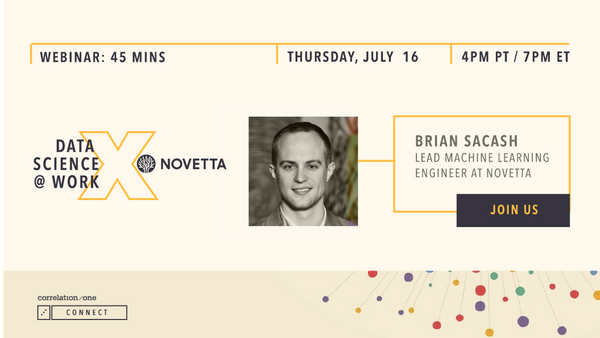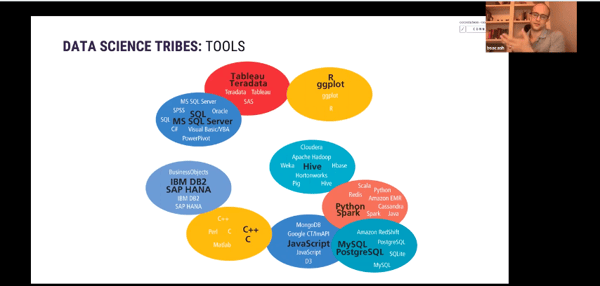Data Science @ Work x Novetta
On Thursday, July 16th, Correlation One hosted the fifth edition of C1 Connect Webinar Series: Data Science @ Work x Novetta featuring Brian Sacash, Lead Machine Learning Engineer and Data Scientist at Novetta.

Novetta is a leader in technology-enabled services, solving complex technical and analytic challenges for the National Security, Government, and Defense communities. Novetta helps government agencies find clarity from complexity in dealing with massive disparate data sets.
Brian is currently a Lead Machine Learning Engineer at Novetta within the Machine Learning Center of Excellence. Brian summed up working at Novetta with the following quote: "Your 9-5 could support more than just your household and has a greater cause too".

In his talk, Brian shared his data career story and highlighted that the path he followed was not direct, saying: "If you had asked me when I graduated with my Physics degree if I'd be where I am today I probably would have laughed at you."
Brian describes his younger self as 'the kid who thought space was so cool' leading him to an undergraduate degree in Physics which provided a strong foundation in mathematics and early exposure to Python. Though he initially planned to continue his career in academia via advanced degrees in Astrophysics and Astronomy, Brian saw how his classmates were applying their training to use cases in the business and technology worlds and was inspired to explore ways his skills could create a more tangible impact.
Ultimately, Brian pursued a masters degree in Quantitative Analytics leading to various roles in different private sector companies and startups focused largely on big data and Cloud computing technologies. Early in his career, Brian was exposed to Natural Language Processing which he thought was 'the coolest thing in the world', a passion that eventually led to his current role at Novetta.
In addition to his own career story, Brian shared an insight on 'Data Science Tribes' derived from an O'Reilly report that he believes is particularly useful for navigating one's data science career based on the tools/ technologies he or she is most comfortable using.

Brian highlighted that the technologies data professionals or aspiring data professionals use on a regular basis are often clustered with adjacent tools. These clusters of technologies, constitute data science 'tribes'. The data science tribes schema can be useful for individuals deciding which data roles to pursue and which skills to focus on while preparing for those roles.
You can watch the full Webinar to learn more about these different tribes and see Brian's answers to the questions below.
- What is the right mindset to have when you are trying to decide on what to do with your data career?
- What are some resources (i.e. books, newsletters, podcasts, blogs) that help you expand your knowledge and mind?
- How do you deal with the problems of translation in NLP? How do you imagine NLP serving people from all different backgrounds and languages?
If you would like to join a future Data Science @ Work session, feel free to follow C1 on Linkedin or join one of our Data Science for All communities on Meetup.
If you are interested in opportunities at Novetta, please apply to C1 Connect here.
About Data Science @ Work
There is a transparency problem in the data talent market.
At C1 we work with thousands of data scientists, data analysts, and data engineers from around the world, and we often hear from job candidates that they are unsure how to evaluate different data career paths, do not know what skills they should focus on developing, and need some guidance on how to find their next data science job.
Across industries, companies are challenged to define the difference between a great data scientist, data analyst, and data engineer on job descriptions. This makes it difficult for candidates to understand what their day-to-day responsibilities will be, how certain jobs will impact their career trajectories, and how common job titles like 'data scientist' differ from one company to another.
This lack of transparency leads to a huge waste of time for both candidates and companies. Candidates adopt 'spray and pray' job application strategies, applying to hundreds of roles that have 'data' in their title. Talent teams are then forced to search through thousands of resumes to find great candidates who then must be triaged to the appropriate role search. Oftentimes, the interview process uncovers that though a candidate is an excellent data scientist, her goals and skills do not align with the role. This wastes the time of the applicant and Senior Data Scientists responsible for conducting late stage technical interviews.
We launched the C1 Connect Data Science @ Work webinar series to break down the communication barriers between hirers and the world's best data scientists, data analysts, and data engineers. Each week, our C1 Connect community is invited to hear directly from data leaders who share background on their career journeys, what working in their industry means practically for data professionals, and some tips for navigating the job search (and if applicable, how they can pursue opportunities with their teams).
After each session, candidates are invited to raise their hand for feature opportunities on C1 Connect by sharing their C1 Connect Datafolios- brief profiles designed to communicate the skills, roles, aspirations, and project work specifically for data professionals. Using C1 Connect's Talent Match Algorithm, we pass on qualified candidates who fit the profile for active opportunities to the proper next steps in the candidate selection process.





